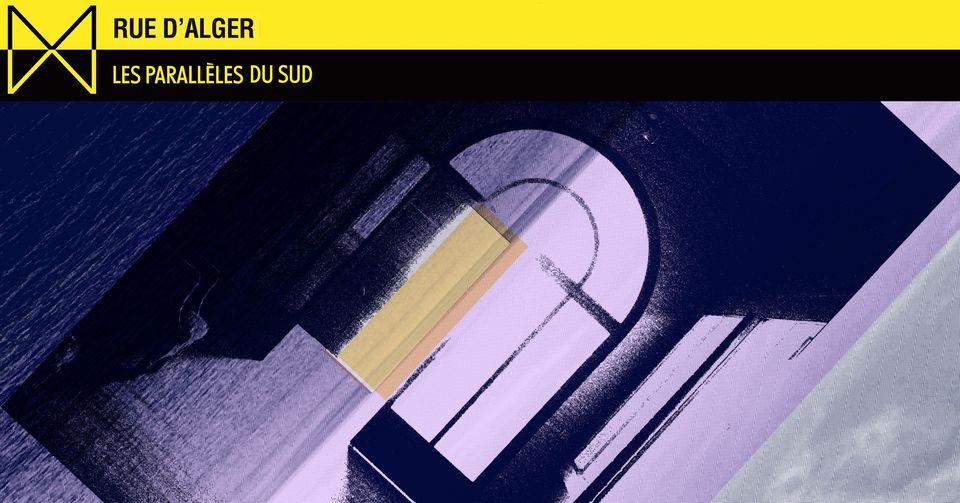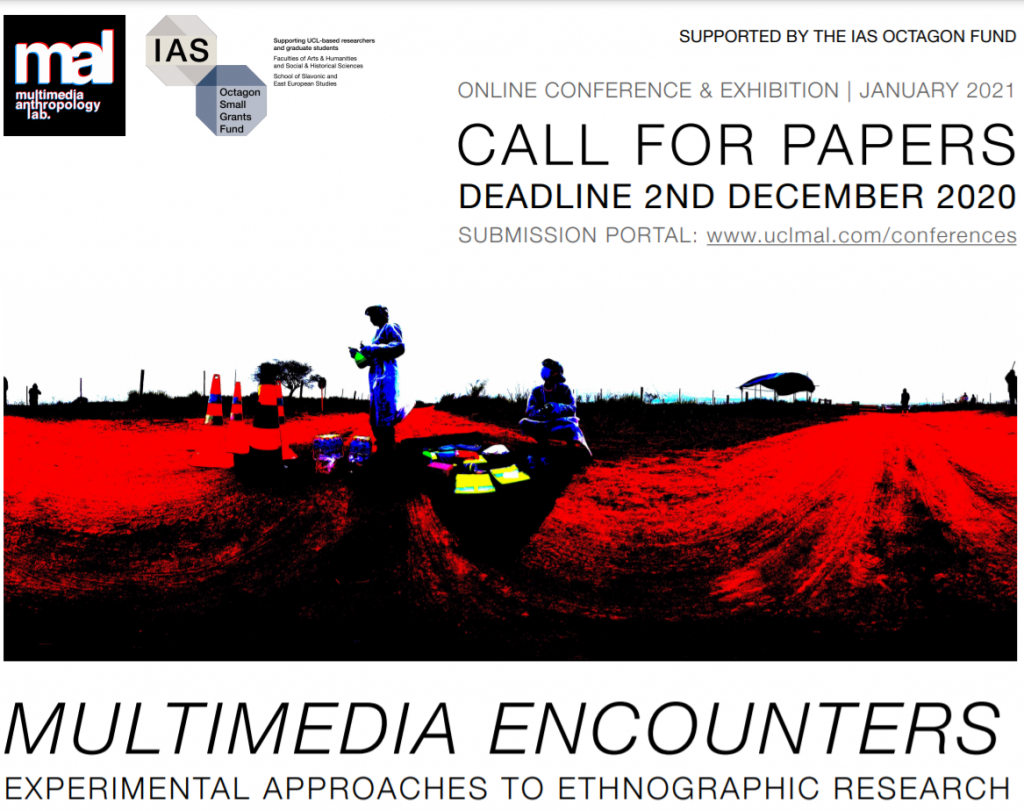
https://www.ruedalger.net/?fbclid=IwAR3CAFMsDHGWMdKDIkssEd_ChPIHoe55nblkQ5GDl1fhyU8c_EyrpcQxoUE
ainsi que sur la page Facebook https://www.facebook.com/RueDAlger
Selected events and academic activities are included in the News-section in order to inform the academic and research community as well as the public about issues related to culture, borders and gender.

CONFERENCE DETAILS & SUBMISSION: https://www.uclmal.com/conferences
How are ethnographic encounters with alterity mediated and transformed by multimedia technologies? Drawing on the insights and questions raised by both material culture studies and the ontological turn, we aim to facilitate a global conversation on the concepts, forms and mediums through which knowledge is produced and shared. This conference is hosted by UCL Multimedia Anthropology Lab, an interdisciplinary research network aimed at developing innovative methods for anthropological practice.
CONFERENCE THEME: KNOWLEDGE OTHERWISE
Anthropological encounters with others have led us to question ideas previously taken as given. Concepts of family, society, culture, nature, and what it means to be human have all been subject to revision. When these critiques are directed towards knowledge itself, the different ideas people have about what knowledge is and how it is shared have led us to question the theories and practices through which we seek to know. Proponents of the ontological turn (Holbraad & Pedersen 2017) have developed these ideas to call for an anthropological project that is radically experimental, drawing on ethnographic encounters with alterity to critically interrogate the analytical concepts that inform our research.
At the same time, material culture studies has pointed towards the important role of materials in the articulation of human knowledge. The materials through which ethnographic encounters are translated into knowledge – as text, image, sound, performance, simulated sensory immersion, etc – shape the ways in which these encounters are experienced by others, and the conceptual affordances they present. We examine how ethnographic encounters with alterity can disrupt not only the conceptual frameworks of anthropology, but also the material practices through which knowledge is produced and communicated, and explore how anthropological knowledge can be both thought and made otherwise.
These questions are especially pertinent in the context of a global pandemic, which has changed the ways we encounter and communicate with others, disrupting diverse forms of knowing and doing. In parallel to this conference, UCL MAL has initiated a partnership with the Kuñangue Aty Guasu, an annual meeting of Guarani & Kaiowá indigenous women in Brazil, which this year will take place online. The translation of this event into an online format allows us to reflect on the parallels between the knowledge practices of indigenous communities and those of anthropologists, and invites us to consider each as a variant (Maniglier 2016) of the other. If we consider the indigenous meeting as an Other kind of conference, and the conference as an Other kind of indigenous meeting, what can we learn about conferences, indigenous meetings, and knowledge itself?
This conference seeks to explore how knowledge can be cast otherwise, in concept, method, and form. We consider how different concepts of knowledge entail different forms of practice, and how different materials and techniques enable different conceptual encounters. What are the conceptual affordances of multimedia encounters with alterity? What is the relation between sensory experience and conceptual movement? Can encounters with alterity be simulated in VR? Can we do theory through film or sound? How can AI traverse multiple ontologies, and what does that mean for concepts? How can websites, social media, and other digital platforms disseminate research findings? Can research be presented as performance? How can an exhibition be posed as an experiment? What is the concept of the concept?
If we are to seriously question the concepts and methods through which we produce knowledge, then our commitment to being radically experimental must go beyond a critique of analytical tools and extend to a thorough interrogation of the methods and mediums through which research is produced and presented.
SUBMISSION GUIDELINES
UCL MAL invites contributions from academics and practitioners across disciplines who engage with these questions, and experiment with innovative approaches to conducting and presenting research. We welcome submissions in any format (accompanied by a written abstract) and encourage contributors to interpret our theme as broadly as possible. We are particularly interested in contributions which explore the following topics/methods:
VR & 360 VIDEO | IMMERSIVE ENVIRONMENTS | SONIC ETHNOGRAPHY | NET ART | PERFORMANCE | ETHNOGRAPHIC FILM | EXHIBITION AS RESEARCH | PROJECTION MAPPING | SCULPTURE | MULTISENSORY MEDIA | INTERACTIVE INSTALLATION | PHOTOGRAMMETRY | AI & MACHINE LEARNING | DIGITAL ANTHROPOLOGY | & MORE
Please submit abstracts of no more than 300 words, and any multimedia materials that are
relevant to your work, by 23:59 GMT on Wednesday the 2nd of December 2020. Please
use the following submission link: www.uclmal.com/conferences
CONFERENCE PROGRAMME & KEYNOTE SPEAKERS
The conference will take place online on the 12th, 13th & 14th of January 2021, and will be accompanied by an online exhibition of multimedia works. Each day will begin with keynote contributions from academics and practitioners whose theory and practice invite us to think otherwise, followed by thematic panels where experimental research approaches and their implications for theory will be debated in more depth. The following keynote speakers have been confirmed so far:
Ludovic Coupaye | Lecturer in Anthropology | UCL
Haidy Geismar | Professor of Anthropology | UCL
Jaqueline Aranduhá | Guarani & Kaiowá Indigenous Leader
The conference is free to attend, but please register for tickets on Eventbrite:
https://www.eventbrite.co.uk/e/multimedia-encounters-experimental-approaches-toethnographic-research-tickets-127591845645
UCL MULTIMEDIA ANTHROPOLOGY LAB
UCL MALis an interdisciplinary research network that explores innovative methods for conducting and presenting ethnographic research. We have organised several seminar series and exhibitions at UCL and have presented work and ideas at Somerset House, Modern Art Oxford, and the Tate Modern. Founded in 2017 by doctoral research students at UCL Anthropology, today MAL is composed of over 50 members around the world, with representatives from anthropology, art, computer science, sound studies, film, and human rights. MAL has been generously supported by UCL Anthropology, the Institute of Advanced Studies, UCL Grand Challenges, and the British Museum.
If you would like to learn more about MAL or our activities please visit our website at www.uclmal.com or contact us directly at info@uclmal.com.
The image above depicts an anthropologist and research assistant sanitising Covid supplies before delivering them to Guarani & Kaiowá indigenous communities in Brazil. The scene, made possible by the presence of a 360 camera, illustrates the hyper-awareness of anthropological encounters in a Covid context and invites us to reflect on the ways in which encounters are mediated – whether by recording technologies, digital tools for remote communication or by PPE.
Conference for the celebration of the bicentennial of the 1821 Greek Revolution
September 24-26 (new date), 2021, Thessaloniki, Greece
Co-organized by:
Folklore and Ethnological Museum of Macedonia-Thrace
Department of Balkan, Slavic and Oriental Studies, University of Macedonia
Laboratory for the Study of Culture, Borders and Gender, (Department of BSΟS, University of Macedonia)
Department of Music Science and Art, University of Macedonia
Section of Folklore, Department of History and Archaeology, University of Ioannina
CALL FOR PAPERS
It is common knowledge in the social sciences that collective identities are neither eternal nor fixed. They are fluid, historically shaped, and object of management and negotiation by collective and individual actors. It is also common ground that national identities have been formed during modernity when the nation-state emerged as an essential and dominant political organization unit.
The outset of the relationship between the nation’s collectivity and the state’s territoriality is traced in the historical period of the industrial and urban revolution in Europe. However, this relationship is redefined continuously and shapes, historically, the dominant narrative around national identity, national origin, and the way the nation and the modern collective self are constructed.
In Greece, despite the debates and different perspectives, the view of the pre-existing cultural community of Hellenism is commonly accepted, and it is reconstructed on a new ground after the national liberation struggles and the establishment of the modern Greek state.
The conference explores ways of constructing the community through performative expressions of collective identities, as they become visible in the institutional discourse, public events, rituals, and symbols used by the state and citizens to (re)produce the nation. These are contexts and processes in which experiences of the self, the collective, the national belonging, and the citizen are produced through interactions, hegemonic discourses, experiences of power, symbolic meanings, and embodied practices.
The concept of performance is chosen as the appropriate theoretical and analytical framework to study complex and multilevel forms of social action and different cultural practices that shape, reproduce or even challenge the multiple discourses and embodied ways in which national identity is constructed.
The conference will host presentations (in Greek or English) and discuss the issue of national identity, focusing on institutions’ role and various forms of performance in the context of institutional discourse, social interaction, and various bodily practices. Indicative thematic areas are as follows:
• Collective, state, and private institutions (e.g., educational institutions, museums, associations, cultural associations)
• Religion, rituals, celebrations, and symbols
• Communities, borders and boundaries
• Space, architecture, monuments, and memory
• Family, kinship, and gender
• Material culture, nutritional practices, customary life
• Language, arts, dance, music, songs, costumes, sports
• Technology, media, digital and audiovisual culture
The invitation is aimed at social sciences and humanities researchers (Social Anthropology, Folklore, History, Sociology, Cultural Studies, etc.) who employ case studies and critical thinking to highlight the meanings and limitations, and dynamics of national identity performances in contemporary times.
Submission of applications – Information
• Summary of up to 250 words (in Greek or English) with the title of the presentation
• Contact details: name, scientific status, email address
• Conference languages: Greek, English
• Deadline for the abstract submission: November 30, 2020
E-mail: lemmth.vsas.synedrio2021@gmail.com
Eleni Gelani, PhD Candidate in Folklore and Social Anthropology, Aristotle University of Thessaloniki
Scientific Committee
Organizational committee
ENTAN is pleased to announce two calls for individual grant applications which aim to encourage research on non-territorial autonomy (NTA) and minority related issues:
– Call for Short Term Scientific Missions (STSM) for scholars who wish to do research at a hosting institution abroad;
– Call for ITC conference grants available to researchers from inclusiveness target countries (ITC) who wish to present papers at conferences abroad.Application deadline is 30 August 2020.For updates, please check our website, and follow the work of ENTAN giving your likes on Facebook, Twitter and Instagram.
– Call for ITC conference grants available to researchers from inclusiveness target countries (ITC) who wish to present papers at conferences abroad.
Application deadline is 30 August 2020.
For updates, please check our website, and follow the work of ENTAN giving your likes on Facebook, Twitter and Instagram.
ENTAN is
organising the First Training School on Non-Territorial Autonomy, 9-11
September 2020, in the border region of Sønderborg, Denmark and
Flensburg, Germany.
Graduate and PhD students,
postdoctoral researchers and young career investigators (including those
who are ENTAN members) are invited to apply. Please share this Call for trainees with your PhD students and younger colleagues.
Application deadline: 15 June 2020.
We
are also inviting a limited number of experienced scholars who can
apply as lecturers on NTA topics, by 15 June 2020. Please find the
details in the Call for lecturers.
For updates, please check our website, and follow the work of ENTAN giving your likes on Facebook, Twitter and Instagram.